Struggling to budget for a new coffee portafilter? With prices varying widely from $10 to nearly $400, making the right investment can feel overwhelming. Understanding the typical price ranges by brand and type will ensure you get value for your money.
Coffee portafilters typically cost between $50-$150 for standard quality models. Entry-level portafilters start around $10-30, mid-range options cost $50-100, while premium portafilters from brands like La Marzocco can exceed $150. High-end specialty portafilters may cost up to $395.
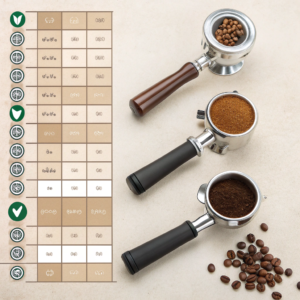
I've spent years working with coffee equipment manufacturers and have seen firsthand how portafilter prices can vary dramatically. Let me break down what you can expect to pay and why, so you can make an informed decision that matches both your budget and coffee quality expectations.
What factors influence coffee portafilter prices?
Confused about why one portafilter costs $30 while another runs $300? The price disparity can leave many coffee enthusiasts puzzled and unsure if premium options truly deliver better value or performance.
Coffee portafilter prices are influenced by materials (stainless steel vs. chrome-plated brass), manufacturing precision, brand reputation, design (bottomless vs. spouted), compatibility with specific machines, and included accessories like filter baskets.
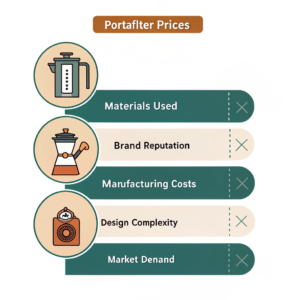
From my manufacturing experience, material quality represents the most significant cost factor in portafilter production. Commercial-grade portafilters utilize 304 or 316 stainless steel, offering superior corrosion resistance and longevity compared to chrome-plated alternatives. This material choice alone can double the manufacturing cost.
Brand reputation also plays a crucial role in pricing. Established brands like La Marzocco command premium prices partly due to their rigorous quality control processes. At our facility, we've implemented similar standards, with each portafilter undergoing multiple inspection points before packaging.
Manufacturing Complexity Factors
| Feature | Impact on Cost | Typical Price Increase |
|---|---|---|
| Precision machining | Higher | +$15-30 |
| Hand-polished finish | Higher | +$10-20 |
| Heat retention design | Moderate | +$10-15 |
| Ergonomic handle | Variable | +$5-25 |
The manufacturing process itself contributes significantly to cost differences. Machine-made portafilters with minimal hand finishing represent the budget segment, while those requiring precision CNC machining and hand-polishing command higher prices. These production differences directly impact extraction quality and consistency - critical factors for commercial settings where coffee quality directly affects business revenue.
How much do entry-level portafilters cost?
Wary of investing in an expensive portafilter when you're just starting your coffee journey? Entry-level options can save you money but may compromise on durability and extraction quality if you choose poorly.
Entry-level coffee portafilters typically cost between $10-$50. Basic models like Ascaso portafilter baskets range from $9.57 to $28.11, while complete portafilter assemblies for home machines generally start around $30-40 from generic manufacturers.
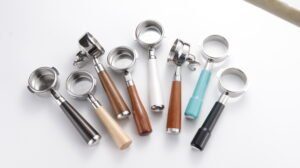
In the entry-level market segment, portafilters demonstrate the widest quality variation. Having inspected thousands of units during my career, I've identified key indicators that separate acceptable budget options from problematic ones.
Most entry-level portafilters utilize chrome-plated brass rather than solid stainless steel construction. While this reduces costs significantly, it also introduces longevity concerns. The chrome plating can wear over time, especially at contact points, potentially introducing unwanted flavors to your coffee.
Entry-Level Portafilter Comparison
| Feature | Generic ($10-20) | Better Quality ($30-50) |
|---|---|---|
| Material | Chrome-plated brass | Chrome-plated brass with reinforcement |
| Filter basket | Single, basic | Multiple, precision-drilled |
| Handle quality | Plastic, basic | Bakelite or basic wood |
| Thread precision | Variable | Consistent |
| Weight | Lighter | Moderate |
When examining budget portafilters, weight often provides an immediate quality indicator. Heavier units typically contain more metal and better construction quality. Similarly, thread quality significantly impacts usability - poorly machined threads can make attachment difficult or inconsistent.
For home users making 1-2 coffees daily, even basic portafilters may provide reasonable service for 1-2 years before requiring replacement. However, for more frequent use, investing in the upper tier of entry-level options ($40-50) typically offers substantially better value through improved durability and extraction consistency.
What's the price range for mid-tier portafilters?
Finding that sweet spot between budget-friendly and premium options can be challenging. Mid-range portafilters promise better quality, but are they worth the extra investment compared to entry-level alternatives?
Mid-tier coffee portafilters typically cost between $50-$100. Popular examples include E61 bottomless portafilters ($74.95-$90), Cimbali portafilters ($80.99-$90), and Profitec bottomless portafilters ($69), offering good quality without premium brand pricing.
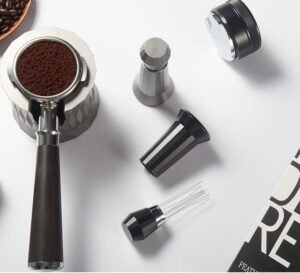
The mid-tier portafilter segment represents the optimal balance between cost and performance for most coffee enthusiasts and small commercial operations. From my experience supplying coffee equipment to businesses across the Middle East and Europe, these portafilters deliver approximately 80% of premium performance at roughly 50% of the cost.
At our manufacturing facility, we've analyzed the construction differences between mid-tier and premium models extensively. Mid-tier portafilters typically feature solid brass construction with either chrome or nickel plating, offering good heat retention and durability. While they may lack the solid stainless steel construction of premium options, they compensate with precision manufacturing and quality control that exceeds entry-level standards.
Mid-Tier Portafilter Characteristics
| Feature | Specification | Benefit |
|---|---|---|
| Material | Brass with quality plating | Good heat stability, moderate durability |
| Filter baskets | Precision-manufactured | Consistent extraction |
| Handle | Bakelite or basic wood | Comfortable grip, moderate insulation |
| Weight | 350-450g | Good thermal mass |
| Thread tolerance | ±0.05mm | Reliable attachment |
The significant quality improvement in mid-tier portafilters comes from manufacturing consistency. While entry-level portafilters often show variation between units, mid-tier options undergo more rigorous quality control. At our facility, we maintain tolerance standards of ±0.05mm for thread specifications and validate weight consistency between production batches.
For coffee shops serving 50-100 coffees daily or serious home enthusiasts, mid-tier portafilters strike an ideal balance. They typically last 3-5 years under commercial use before showing signs of wear that might affect performance, making them a cost-effective choice for quality-conscious buyers with moderate budgets.
How much should you expect to pay for premium portafilters?
Wondering if those expensive premium portafilters are worth their hefty price tags? With some models exceeding $300, it's natural to question whether the performance improvement justifies the significant cost increase.
Premium coffee portafilters typically cost between $150-$395. High-end examples include La Marzocco bottomless portafilters (starting at $150) and Weber Workshops Unifilter ($395), featuring precision engineering, superior materials, and optimal thermal properties for exceptional extraction quality.
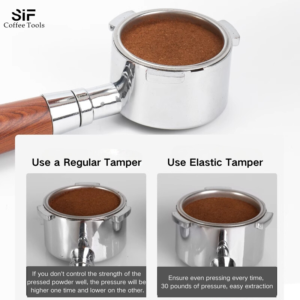
Premium portafilters represent the pinnacle of coffee extraction technology, with prices reflecting their sophisticated engineering and materials. Having supplied portafilters to high-end coffee establishments throughout Dubai and Europe, I've witnessed firsthand how these components contribute to exceptional coffee quality in demanding commercial environments.
The distinguishing characteristics of premium portafilters begin with material selection. Most utilize solid stainless steel construction (typically 304 or 316 grade) or specialized alloys designed specifically for optimal thermal properties. This construction eliminates concerns about plating deterioration while providing superior heat stability during extraction.
Premium Portafilter Manufacturing Standards
| Quality Aspect | Specification | Impact on Performance |
|---|---|---|
| Material | Solid stainless steel | Superior durability, no taste contamination |
| Machining precision | ±0.01mm tolerance | Perfect seal, consistent extraction |
| Surface finish | Mirror polished | Reduced coffee adhesion, easier cleaning |
| Weight | 450-650g | Exceptional heat retention |
| Handle | Premium hardwood/custom materials | Superior insulation, ergonomics |
Beyond materials, premium portafilters undergo extraordinarily precise manufacturing processes. Companies like Weber Workshops and La Marzocco employ advanced CNC machining with tolerances as tight as ±0.01mm, creating perfect seals against the group head gasket and eliminating extraction channeling due to manufacturing imperfections.
Another significant factor justifying premium pricing is product longevity. These portafilters routinely deliver 7-10+ years of commercial service without performance degradation. When calculated on a per-year basis, their higher initial investment often represents better long-term value than repeatedly replacing lower-quality alternatives.
Conclusion
Coffee portafilters range dramatically in price from $10 to $395 depending on quality, materials, and brand. For most users, mid-tier options between $50-100 offer the best balance of quality and value, while premium models deliver superior performance for professionals.




